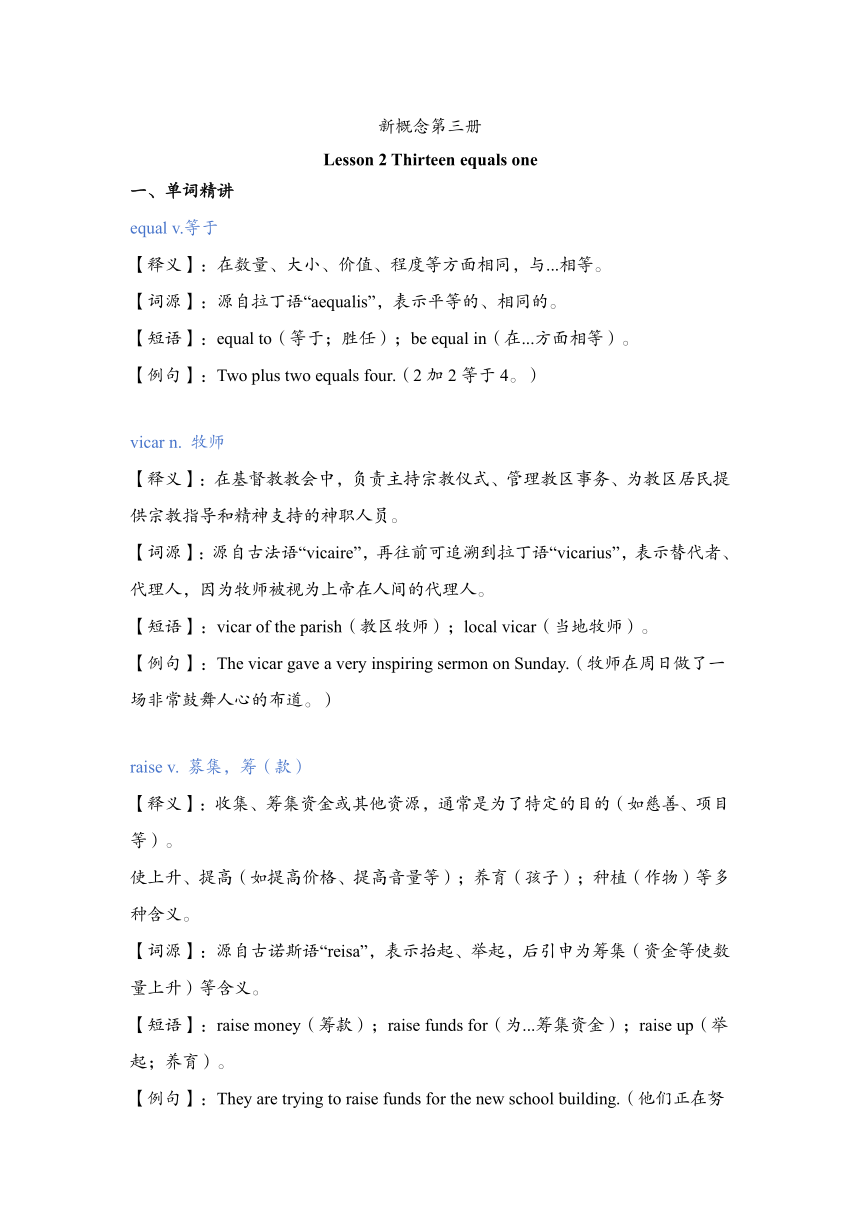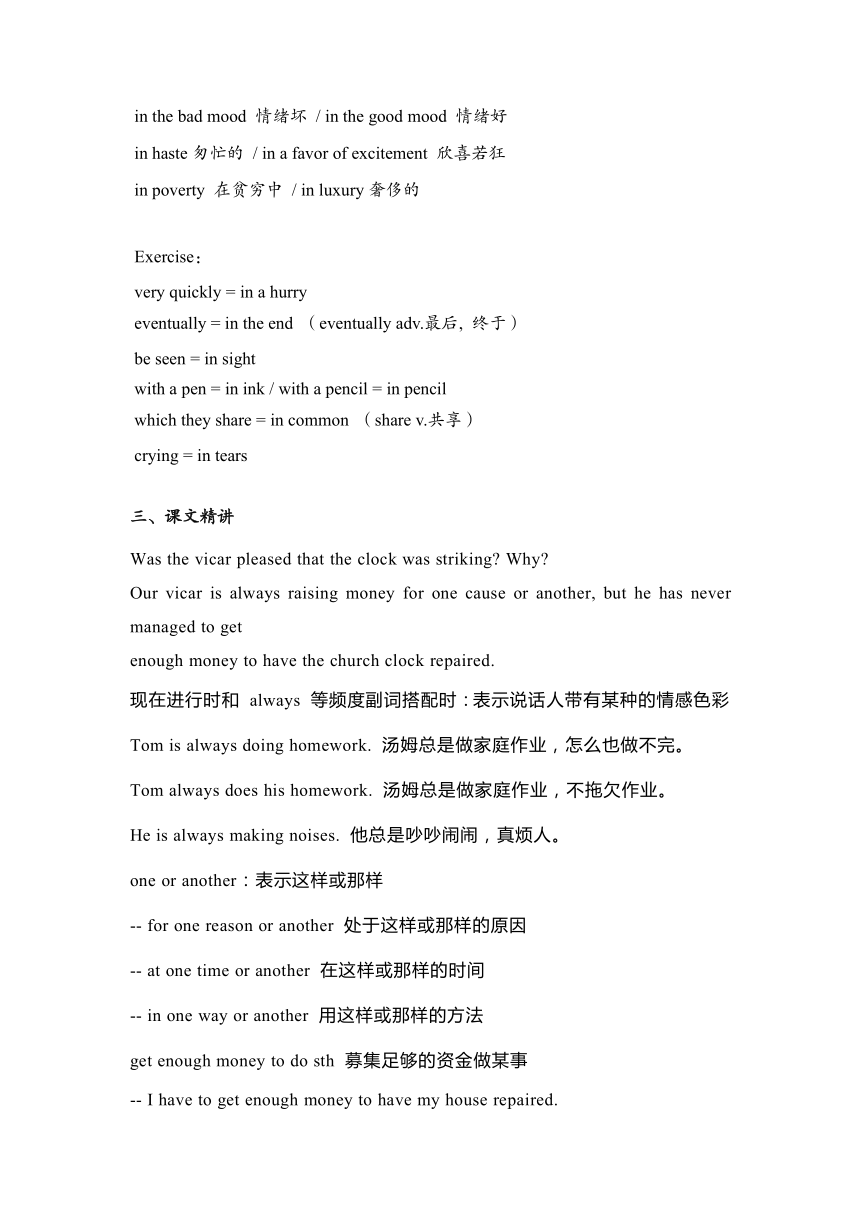新概念第三册Lesson 2 Thirteen equals one讲义
文档属性
| 名称 | 新概念第三册Lesson 2 Thirteen equals one讲义 |

|
|
| 格式 | docx | ||
| 文件大小 | 258.0KB | ||
| 资源类型 | 教案 | ||
| 版本资源 | 新概念英语 | ||
| 科目 | 英语 | ||
| 更新时间 | 2024-12-04 00:00:00 | ||
图片预览



文档简介
新概念第三册
Lesson 2 Thirteen equals one
单词精讲
equal v.等于
【释义】:在数量、大小、价值、程度等方面相同,与...相等。
【词源】:源自拉丁语“aequalis”,表示平等的、相同的。
【短语】:equal to(等于;胜任);be equal in(在...方面相等)。
【例句】:Two plus two equals four.(2加2等于4。)
vicar n. 牧师
【释义】:在基督教教会中,负责主持宗教仪式、管理教区事务、为教区居民提供宗教指导和精神支持的神职人员。
【词源】:源自古法语“vicaire”,再往前可追溯到拉丁语“vicarius”,表示替代者、代理人,因为牧师被视为上帝在人间的代理人。
【短语】:vicar of the parish(教区牧师);local vicar(当地牧师)。
【例句】:The vicar gave a very inspiring sermon on Sunday.(牧师在周日做了一场非常鼓舞人心的布道。)
raise v. 募集,筹(款)
【释义】:收集、筹集资金或其他资源,通常是为了特定的目的(如慈善、项目等)。
使上升、提高(如提高价格、提高音量等);养育(孩子);种植(作物)等多种含义。
【词源】:源自古诺斯语“reisa”,表示抬起、举起,后引申为筹集(资金等使数量上升)等含义。
【短语】:raise money(筹款);raise funds for(为...筹集资金);raise up(举起;养育)。
【例句】:They are trying to raise funds for the new school building.(他们正在努力为新校舍筹集资金。)
torchlight n. 电筒光
【释义】:手电筒发出的光,用于在黑暗中照明。
【词源】:由“torch”(手电筒)和“light”(光)组成,表示手电筒所发出的光线。
【短语】:in the torchlight(在电筒光下);torchlight parade(手电筒游行)。
【例句】:We could see the path clearly in the torchlight.(在电筒光下我们能清楚地看到小路。)
重点句型
in
1>与表达惊奇、恐惧、失望或生气等感彩的名词搭配连用, 在句中起状语作用。
in surprise惊奇地 / in astonishment惊愕的
in alarm恐吓的 / in embarrassment窘迫的
in amazement极为惊讶 / in despair绝望的
in dismay沮丧的 / in anger恼火的 / in disappointment失望的
2>表示以、用。用于语言, 书写材料, 色彩或声音等方面。
in English / in pencil / in ink / in oil 用颜料 / in red用红色 / in code用代码
in such a high voice 用这么高的声音 / in a few words 用几句话
3>表示状态、情况或处境
in trouble / in difficulty 在困境中 / in bed 在床上 / in a hurry 匆忙的
in debt负债 / in love with sb爱上某人 / in tears流着泪
in good order 有条不紊, 整齐, 情况正常 / in good repair 维修良好
in good health 身体好 / in poor health 身体坏
in the bad mood 情绪坏 / in the good mood 情绪好
in haste匆忙的 / in a favor of excitement 欣喜若狂
in poverty 在贫穷中 / in luxury奢侈的
Exercise:
very quickly = in a hurry
eventually = in the end (eventually adv.最后, 终于)
be seen = in sight
with a pen = in ink / with a pencil = in pencil
which they share = in common (share v.共享)
crying = in tears
三、课文精讲
Was the vicar pleased that the clock was striking Why
Our vicar is always raising money for one cause or another, but he has never managed to get
enough money to have the church clock repaired.
现在进行时和 always 等频度副词搭配时:表示说话人带有某种的情感色彩
Tom is always doing homework. 汤姆总是做家庭作业,怎么也做不完。
Tom always does his homework. 汤姆总是做家庭作业,不拖欠作业。
He is always making noises. 他总是吵吵闹闹,真烦人。
one or another:表示这样或那样
-- for one reason or another 处于这样或那样的原因
-- at one time or another 在这样或那样的时间
-- in one way or another 用这样或那样的方法
get enough money to do sth 募集足够的资金做某事
-- I have to get enough money to have my house repaired.
have something done
1>找某人来做某事
-- have the church clock repaired
-- have the plane repaired / -- have hair cut
2>某人所遭受到的意外某种情况(主语必须是发出动作的人)
-- His wallet was stolen. He had his wallet stolen.
The big clock which used to strike the hours day and night was damaged many years ago
and has been silent ever since.
used to:过去常常做,而现在不再发生的事情了。
-- He used to smoke every day.
One night, however, our vicar woke up with a start: the clock was striking the hours!
However -- 在口语中, 主要用于句首;在作文中, 最好用在句中、句尾。
要用逗号分隔开来
-- He said that it was so, he was mistaken, however.
He said that it was so, however, he was mistaken.
他说这件事就是如此,然而他弄错了。
-- I know his story, however, I wouldn t like to tell you.
I know his story, I, however, wouldn t like to tell you.
However = Nevertheless (adv. conj.) = Nonetheless (adv.)
Start n.vt.惊跳, 惊起
-- The noise made him started(v.).
-- What a start(n.) you give me. / -- he stood up with a start(n.).
Looking at his watch, he saw that it was one o clock, but the bell struck thirteen times 关注“新标准英语”,免费同步辅导,免费海量资源
before it stopped.
before:...才
-- Nearly a week passed before she could explain what had happened to her.
Armed with a torch, the vicar went up into the clock tower to see what was going on.
Armed with a torch... 过去分词
Looking at his watch… 现在分词
分词做状语/定语的时候,一定要注意它和逻辑主语要呼应一致
In the torchlight, he caught sight of a figure whom he immediately recognized as Bill Wilkins
, our local grocer.
in the torchlight 在手电筒光下 / in the moonlight 在月光下
in the sunshine 在太阳光下 / in the candlelight 在烛光下
非正式用语中 whom 可以省略掉
recognized somebody as… 认出某人是…
regard somebody as 认为某人是 / think of somebody as 认为某人是
treat somebody as 把某人对待为 / have on somebody as 把某人尊敬为
Whatever are you doing up here Bill asked the vicar in surprise.
Whatever 中的 ever 用来加强语气
I m trying to repair the bell, answered Bill. I ve been coming up here night after night for
weeks now. You see, I was hoping to give you a surprise.
night after night 一夜连着一夜
day after day 一天又一天 / year after year 一年又一年
week after week 一周又一周 / bus after bus 一辆车接着一辆车
You certainly did give me a surprise! said the vicar.
肯定句中常用 do, did, does 加强语气和情感色彩(一定要位于动词原形之前)
-- You do like nice today. 你今天看上去确实很不错。
-- I do like you.
You ve probably woken up everyone in the village as well.
as well 用在句尾相当于 too, 主要用于肯定句中, 但比 too 所表达的语意更优秀。
-- You looked nice yesterday and you look beautiful as well today.
Still, I m glad the bell is working again.
still 用于句首, 用逗号分隔开来, 表达一个转折的关系:虽然如此, 但是
‘That s the trouble, vicar,’ answered Bill.
It s working all right, but I m afraid that at one o clock it will strike thirteen times and
there s nothing I can do about it."
There is nothing I can do about it = I am at a lose what to do(at a loss adv.困惑)
‘We ll get used to that, Bill,’ said the vicar.
"Thirteen is not as good as one, but it s better than nothing. Now let s go downstairs and
have a cup of tea.
get used to / be used to / be accustomed to / get accustomed to 都表示习惯于
get 强调渐近的过程, be 强调习惯了的状态
Lesson 2 Thirteen equals one
单词精讲
equal v.等于
【释义】:在数量、大小、价值、程度等方面相同,与...相等。
【词源】:源自拉丁语“aequalis”,表示平等的、相同的。
【短语】:equal to(等于;胜任);be equal in(在...方面相等)。
【例句】:Two plus two equals four.(2加2等于4。)
vicar n. 牧师
【释义】:在基督教教会中,负责主持宗教仪式、管理教区事务、为教区居民提供宗教指导和精神支持的神职人员。
【词源】:源自古法语“vicaire”,再往前可追溯到拉丁语“vicarius”,表示替代者、代理人,因为牧师被视为上帝在人间的代理人。
【短语】:vicar of the parish(教区牧师);local vicar(当地牧师)。
【例句】:The vicar gave a very inspiring sermon on Sunday.(牧师在周日做了一场非常鼓舞人心的布道。)
raise v. 募集,筹(款)
【释义】:收集、筹集资金或其他资源,通常是为了特定的目的(如慈善、项目等)。
使上升、提高(如提高价格、提高音量等);养育(孩子);种植(作物)等多种含义。
【词源】:源自古诺斯语“reisa”,表示抬起、举起,后引申为筹集(资金等使数量上升)等含义。
【短语】:raise money(筹款);raise funds for(为...筹集资金);raise up(举起;养育)。
【例句】:They are trying to raise funds for the new school building.(他们正在努力为新校舍筹集资金。)
torchlight n. 电筒光
【释义】:手电筒发出的光,用于在黑暗中照明。
【词源】:由“torch”(手电筒)和“light”(光)组成,表示手电筒所发出的光线。
【短语】:in the torchlight(在电筒光下);torchlight parade(手电筒游行)。
【例句】:We could see the path clearly in the torchlight.(在电筒光下我们能清楚地看到小路。)
重点句型
in
1>与表达惊奇、恐惧、失望或生气等感彩的名词搭配连用, 在句中起状语作用。
in surprise惊奇地 / in astonishment惊愕的
in alarm恐吓的 / in embarrassment窘迫的
in amazement极为惊讶 / in despair绝望的
in dismay沮丧的 / in anger恼火的 / in disappointment失望的
2>表示以、用。用于语言, 书写材料, 色彩或声音等方面。
in English / in pencil / in ink / in oil 用颜料 / in red用红色 / in code用代码
in such a high voice 用这么高的声音 / in a few words 用几句话
3>表示状态、情况或处境
in trouble / in difficulty 在困境中 / in bed 在床上 / in a hurry 匆忙的
in debt负债 / in love with sb爱上某人 / in tears流着泪
in good order 有条不紊, 整齐, 情况正常 / in good repair 维修良好
in good health 身体好 / in poor health 身体坏
in the bad mood 情绪坏 / in the good mood 情绪好
in haste匆忙的 / in a favor of excitement 欣喜若狂
in poverty 在贫穷中 / in luxury奢侈的
Exercise:
very quickly = in a hurry
eventually = in the end (eventually adv.最后, 终于)
be seen = in sight
with a pen = in ink / with a pencil = in pencil
which they share = in common (share v.共享)
crying = in tears
三、课文精讲
Was the vicar pleased that the clock was striking Why
Our vicar is always raising money for one cause or another, but he has never managed to get
enough money to have the church clock repaired.
现在进行时和 always 等频度副词搭配时:表示说话人带有某种的情感色彩
Tom is always doing homework. 汤姆总是做家庭作业,怎么也做不完。
Tom always does his homework. 汤姆总是做家庭作业,不拖欠作业。
He is always making noises. 他总是吵吵闹闹,真烦人。
one or another:表示这样或那样
-- for one reason or another 处于这样或那样的原因
-- at one time or another 在这样或那样的时间
-- in one way or another 用这样或那样的方法
get enough money to do sth 募集足够的资金做某事
-- I have to get enough money to have my house repaired.
have something done
1>找某人来做某事
-- have the church clock repaired
-- have the plane repaired / -- have hair cut
2>某人所遭受到的意外某种情况(主语必须是发出动作的人)
-- His wallet was stolen. He had his wallet stolen.
The big clock which used to strike the hours day and night was damaged many years ago
and has been silent ever since.
used to:过去常常做,而现在不再发生的事情了。
-- He used to smoke every day.
One night, however, our vicar woke up with a start: the clock was striking the hours!
However -- 在口语中, 主要用于句首;在作文中, 最好用在句中、句尾。
要用逗号分隔开来
-- He said that it was so, he was mistaken, however.
He said that it was so, however, he was mistaken.
他说这件事就是如此,然而他弄错了。
-- I know his story, however, I wouldn t like to tell you.
I know his story, I, however, wouldn t like to tell you.
However = Nevertheless (adv. conj.) = Nonetheless (adv.)
Start n.vt.惊跳, 惊起
-- The noise made him started(v.).
-- What a start(n.) you give me. / -- he stood up with a start(n.).
Looking at his watch, he saw that it was one o clock, but the bell struck thirteen times 关注“新标准英语”,免费同步辅导,免费海量资源
before it stopped.
before:...才
-- Nearly a week passed before she could explain what had happened to her.
Armed with a torch, the vicar went up into the clock tower to see what was going on.
Armed with a torch... 过去分词
Looking at his watch… 现在分词
分词做状语/定语的时候,一定要注意它和逻辑主语要呼应一致
In the torchlight, he caught sight of a figure whom he immediately recognized as Bill Wilkins
, our local grocer.
in the torchlight 在手电筒光下 / in the moonlight 在月光下
in the sunshine 在太阳光下 / in the candlelight 在烛光下
非正式用语中 whom 可以省略掉
recognized somebody as… 认出某人是…
regard somebody as 认为某人是 / think of somebody as 认为某人是
treat somebody as 把某人对待为 / have on somebody as 把某人尊敬为
Whatever are you doing up here Bill asked the vicar in surprise.
Whatever 中的 ever 用来加强语气
I m trying to repair the bell, answered Bill. I ve been coming up here night after night for
weeks now. You see, I was hoping to give you a surprise.
night after night 一夜连着一夜
day after day 一天又一天 / year after year 一年又一年
week after week 一周又一周 / bus after bus 一辆车接着一辆车
You certainly did give me a surprise! said the vicar.
肯定句中常用 do, did, does 加强语气和情感色彩(一定要位于动词原形之前)
-- You do like nice today. 你今天看上去确实很不错。
-- I do like you.
You ve probably woken up everyone in the village as well.
as well 用在句尾相当于 too, 主要用于肯定句中, 但比 too 所表达的语意更优秀。
-- You looked nice yesterday and you look beautiful as well today.
Still, I m glad the bell is working again.
still 用于句首, 用逗号分隔开来, 表达一个转折的关系:虽然如此, 但是
‘That s the trouble, vicar,’ answered Bill.
It s working all right, but I m afraid that at one o clock it will strike thirteen times and
there s nothing I can do about it."
There is nothing I can do about it = I am at a lose what to do(at a loss adv.困惑)
‘We ll get used to that, Bill,’ said the vicar.
"Thirteen is not as good as one, but it s better than nothing. Now let s go downstairs and
have a cup of tea.
get used to / be used to / be accustomed to / get accustomed to 都表示习惯于
get 强调渐近的过程, be 强调习惯了的状态
同课章节目录
